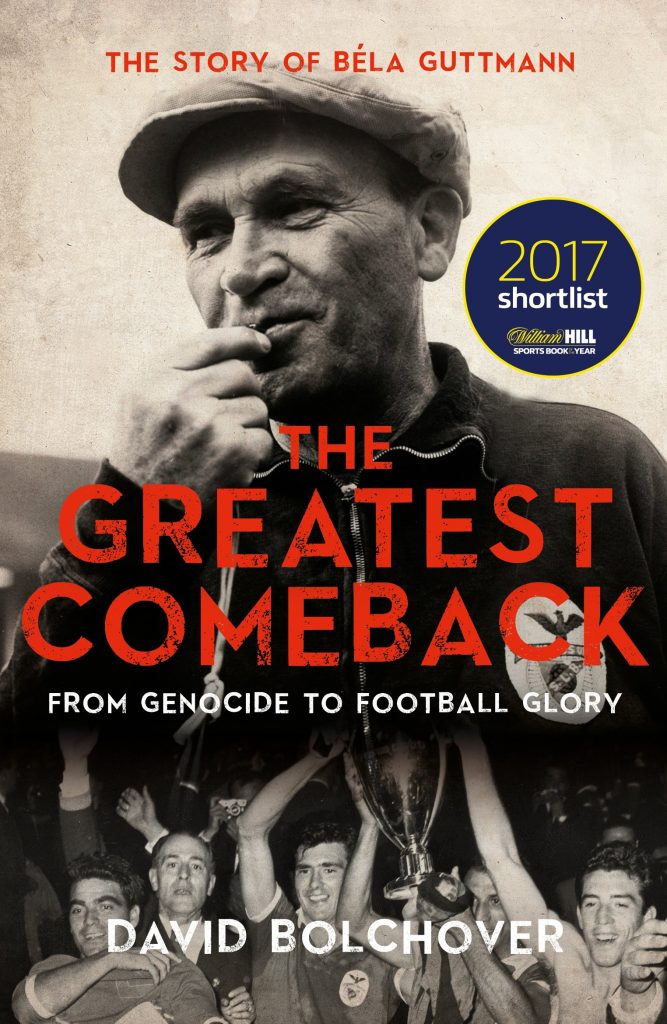Book Review: The Greatest Comeback – From Genocide To Football Glory by David Bolchover

In 2012, renown sportswriter and journalist, Anthony Clavane released a book titled, Does Your Rabbi Know You’re Here, which focused on the exploration of, “the role of Jews in English football’s transformation from a working-class pursuit played in the crumbling arenas to a global entertainment industry”. He did so by looking at the stories of eleven key figures (although many others are detailed in the book), through three stages to illustrate the integration of Jews into English society.
Adding to this list of writing uncovering the influence of Jews in the global game is David Bolchover’s, The Greatest Comeback – From Genocide To Football Glory, which looks at the life of Bela Guttmann, a name more likely to be recognised and revered in Portugal than anywhere else in Europe. The reason for this, being that this player and influential coach born in Budapest, went on to win two successive European Cups in 1960/61 and 1961/62 with Lisbon based, Benfica.
As with Clavane’s book, Bolchover is not just focusing on the game of football and there are wider issues explored. In the case of Guttmann’s story, each of the eleven chapters is proceeded by some historical context which details the persecution of Jews at various times and places around the world. Whilst harrowing to read, the graphic details help the reader understand that Jews have been targeted down the years, and not just in the Holocaust. As is understandable from a Jewish author, Bolchover explores the hatred and prejudice that Jews experienced through Guttmann’s life, and the timeline of his football playing and coaching career.
Guttmann’s professional career saw him playing from 1919 to 1933 chiefly as a midfielder, winning the Hungarian title in 1919/20 with MTK Hungaria FC, the Austrian Championship in 1920/21 with SC Hakoah Wien and the National Challenge Cup in the USA with New York Hakoah in 1929. In addition, he earned six caps for Hungary between 1921 and 1924. The Hakoah Wien side was considered to be a force to be reckoned with and in touring the USA during 1926 drew large crowds on an extensive tour. Once he finished playing, Guttmann turned to coaching, taking charge of SC Hakoah Wien, Enschede, Hakoah Wien and Ujpest, in spells of two years or less, which were to be symptomatic of his length of stays at Clubs after the Second World War. At Ujpest he managed the side to the Hungarian League title in 1938/39 and won the Mitropa Cup in 1939.
Previous to Bolchover’s book, the truth around Guttmann’s whereabouts during the Second World War were unclear. However, the author discovers that Guttmann spent time hidden in an attic of his brother-in-law’s in Ujpest and then was in a Labour Camp. Resuming coaching with Vasas SC in Hungary in 1945, Guttmann went on to work with another nineteen clubs, finishing at Porto in 1973 and a brief spell in 1964 as Austrian National Coach. During that 28 spell he plied his trade in in a nomadic journey through Hungary, Romania, Italy, Argentina, Cyprus, Brazil, Portugal, Uruguay, Switzerland, Greece and Austria; winning trophies with Ujpest, Sao Paulo, Porto and Benfica.
However, this story about a coach influential in the development of the 4-2-4 playing system, doesn’t hold back in reflecting the darker side of Guttmann’s character, for which Bolchover is to be commended. Details of his involvement in a hit-and-run death in Milan in 1955 are laid out for the reader as is the gambling problem that Guttmann had, which the author contends may have been part of the reason why the coach went on working until he was 74. Guttmann was also very much a man who demanded that things by his players and Directors were done his way, and in the cases where this didn’t occur he walked away or was removed from his roles at Honved, AC Milan and Benfica.
Amongst a book that it is a recommended read (and rightly nominated in the 2017 William Hill Sports Book of the Year Short-list), is a telling story about how little Guttmann was recognised in England and indeed the parochialism in the English game. In 1962 after leaving Benfica and having won a second successive European Cup, he had “two firm offers for his services…both from teams whose name began with a ‘P’. There was Penarol, the best club team in the world, reigning champions of Uruguay and South America and holders of the Intercontinental Cup…and there was Port Vale, having just finished twelfth in the Third Division of the English League.”
An incredible career, an incredible character and no ordinary read about a coach who was an influence on the way the game is played today and a survivor of the worst genocide in history.